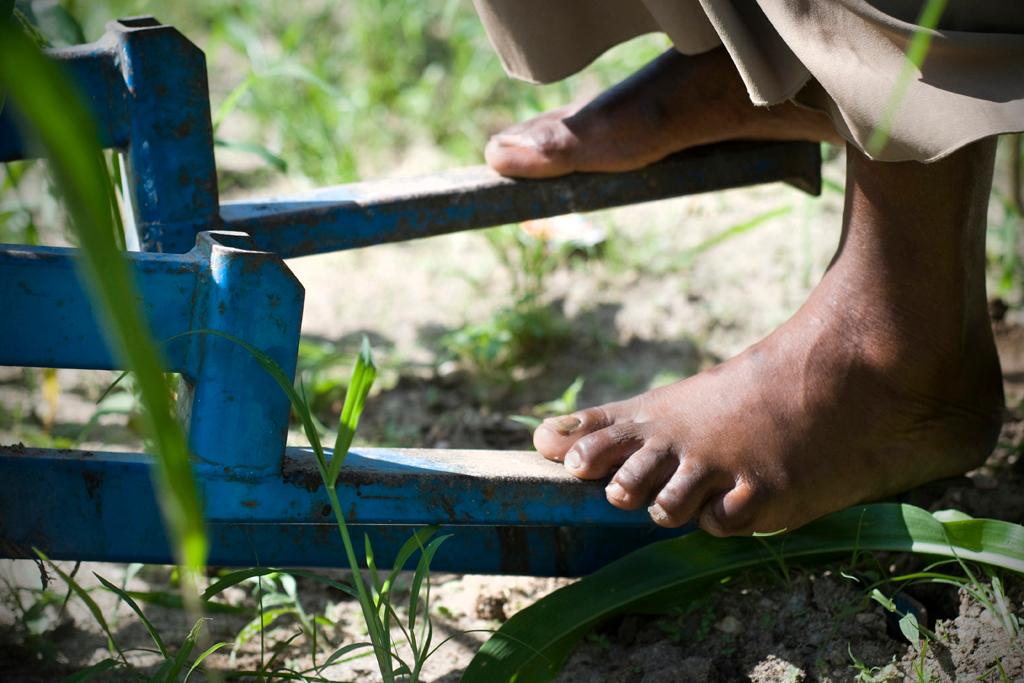Transforming Africa’s agriculture with a pump
The KickStart pump can irrigate up to 2 acres with a simple foot-pedal system. The pump, which requires two people to operate, can draw water up from 23 feet and has a total pumping head of 46 feet. It costs around $112.
DAR ES SALAAM, Tanzania — How can Africa break out of its dependence upon subsistence farming?
One way is through simple water pumps. Across the continent farmers depend on rainfall to nourish their crops and despite hard work only manage to eke out a meager living.
Pantaleo Anney was penniless when he moved to Kiluvya, a village on the outskirts of Tanzania's capital city, Dar es Salaam, in 2006. His business, selling handmade rugs and mats in a small town near Arusha, failed after one single day of unexpected rains soaked and destroyed his entire capital — a small cart full of rugs on their way to the market.
After years of stringing together odd jobs like hauling gravel and working as a security guard, Anney took a risk and invested his savings, the equivalent of $100, in a water pump. A year later, he’s making almost $200 a month, a nearly seven-fold income increase, and recently appeared on the cover of Nipashe, a local business newspaper, under the heading “From Carrying Gravel to Owning a Garden.”
Anney, 33, thanks his success to an innovative manual pump system, designed to cheaply and effectively irrigate 1 to 2 acres of land. The pump is finding customers, rich and poor, across East Africa.
KickStart, creator of the pumps, is a social enterprise which for the past 22 years has designed, marketed, and sold appropriate technologies meant to “get millions of people out of poverty quickly, cost-effectively and sustainably.” The company says its aim is to “change the way the world fights poverty.”
The MoneyMaker Hip Pump and Super MoneyMaker Pump, KickStart’s two flagship products, have helped launch over 111,800 new businesses, lifted over 500,000 people out of poverty, and are generating $113 million in new profits annually through agriculture, according to their website. The pumps, on average, result in a “10-fold increase in income" for customers, according to KickStart’s co-founder Nick Moon.
“It’s not about having the best mousetrap in the world. It’s about painting it the right color, giving it the right name, and making it accessible to people,” says Moon.
Some 90 to 96 percent of sub-Saharan Africa’s population is still dependent on rain-fed agriculture, where crops can be harvested only once or twice per year, resulting in a feast-famine production cycle that continually challenges Africa.
In Tanzania, the agricultural sector accounts for nearly 80 percent of employment and 75 percent of rural household income, yet only 26.5 percent of GDP. Land for farming is readily available. Effective tools for small-scale irrigation, on the other hand, are not.
Alfred Wise, KickStart’s Country Director for Tanzania, explains that technologies such as the MoneyMaker pumps allow people “to grow more, more often.” The pumps enable small landholder farmers to switch from low value to high value crops, and become less dependent on rain.
Through marketing these cost-effective pumps, KickStart is vying to transform small, subsistence farmers into productive business units that, they hope, will feed Africa’s growing food demands.
Although KickStart is a nonprofit organization, they consider themselves a “social enterprise” because they sell their pumps, rather than distributing them for free. Through an extensive network of 220 branded dealers across Tanzania, they have sold over 40,000 pumps since beginning operations in 2000, at a price much lower than diesel pumps ($66 for the MoneyMaker Hip and $112 for the Super MoneyMaker.)
Moon says that KickStart is a nonprofit due to the high cost of funding R&D efforts for these productivity-increasing technologies. Since “the African governments are not typically funding R&D”, he says that donors are needed to support R&D and subsidize the cost of the pumps and accelerate the diffusion of this technology.
Yet the pumps have their limitations. Only 12 percent of sub-Saharan Africa’s population lives in areas with a water source within 23 feet of the surface to use the pump.
In addition, not all customers are using the pumps to be “lifted out of poverty.” Gideon Mgweno, a Monitoring and Evaluation officer for KickStart Tanzania, estimates 12 to 20 percent of their pumps are purchased by individuals who use them for domestic use, such as pumping water into an elevated tank when the electricity is out. Finally, the pump can’t help those who lack land, seeds, fertilizers and a market.
Despite their limitations, these pumps appear to highlight the power, potential and ultimate need for innovation in Africa’s agricultural sector.
The need to feed more than a billion people across the continent is only growing, and the need for technologies that can harness the existing resources and increase production is great. The aim is to get more farmers like Pantaleo Anney to become more productive farmers.
“Every community has self-driven entrepreneurs, who see opportunities and take the risks. It’s through these people you will truly achieve sustainable development”, says KickStart's founder Moon. Getting appropriate technology to these people will help to create “real, lasting, and cost-effective change.”
